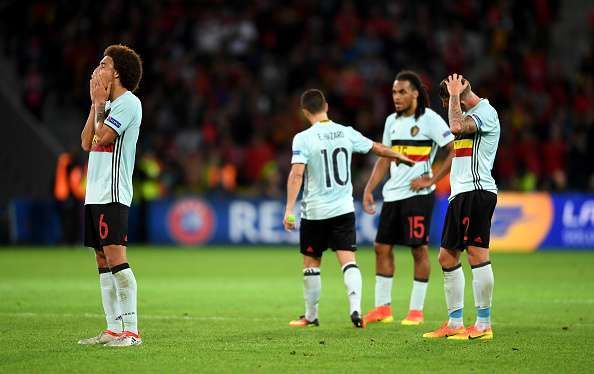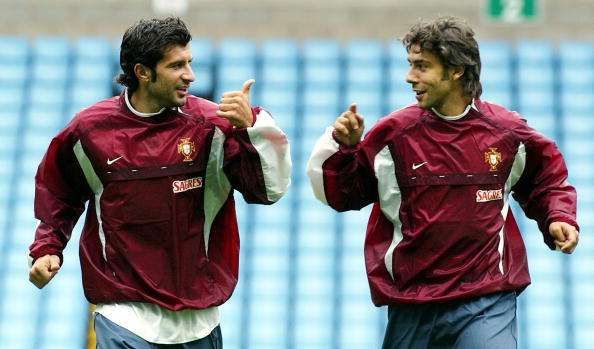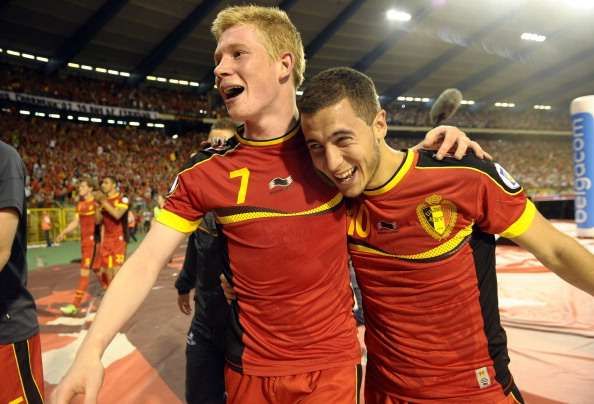
Is Belgium's golden generation following the path of Portugal's golden generation?

The term ‘Golden Generation’ has been used most notably in reference to the England team from the previous generation, which contained Premier League stars of the ilk of Beckham, Gerrard, Lampard, and Rooney, among others. More recently, the Ivory Coast team captained by Didier Drogba, which also has the likes of the Toure brothers were also labelled as a failed golden generation, before they made good on the promise with a win at the African Cup of Nations
There’s no doubt, though, that the original use of the term was for Portugal’s group of players who won two consecutive Fifa World Youth Championships (in 1989 and 1991). The second of those victories came with a team that was quite similar to the French U-20 national team in which Pogba burst into the limelight in 2013, as the Player of the Tournament.

Led by the most golden of boys Luis Figo, a creative and skillful playmaker rising through the ranks at Sporting Club de Portugal, that team forged relationships between him and a number of other players who went on to achieve great things in club football. They include the likes of Rui Costa, Joao Pinto, and Peixe.
Quite like Belgium, however, this promise was not immediately capitalized upon by Portugal, who did not qualify for the World Cups of 1994 and 1998 despite the presence of such precociously talented players all over the pitch. Till Euro 2000, when they reached the semifinal, they did not show any signs of living up to the promise.
Even their first World Cup campaign as a unit, in 2002, was a failure of sorts, with Portugal bowing out in the group stages after a 3-2 loss to then-minnows USA, and 1-0 to South Korea after a 4-0 pounding of Poland.
It was not until 2004 that Portugal’s Golden Generation finally displayed its full menace, romping to the final of their home Euros before losing to historically brilliant surprise packages Greece in a 1-0 loss that defied all footballing logic. It was Portugal’s second loss to Greece in the same tournament, moreover.
The World Cup of 2006 saw players like Ronaldinho, Zidane, Ronaldo, Del Piero playing their last World Cup. Despite facing tough fixtures like England and the Netherlands in the knockouts, Portugal went on to finish fourth as the ‘Most Entertaining Team of The Tournament’.
This marked the end of a 6-year spell in which Portugal finished with 2 semi-final appearances and 1 final appearance in major tournaments. Not bad for most teams in world football, but many critics marked this Portugal side ultimately as a failure, in almost the same fashion as England’s generation has been.
Not remotely kind treatment, but for a football-crazy nation presented with the hope of winning major titles for the first time, this seemed like a Christmas cancelled. Although Belgium’s current team is not yet finished with fighting it out for trophies, this edition of the Euros looked like their best chance to stamp their name into the history books, and it has gone begging.

Belgium can today look to Eden Hazard as its source of inspiration in attack, just like Portugal looked to Luis Figo in his heyday. In addition, they also have silky, smooth and maddeningly efficient Kevin de Bruyne, while Yannick Ferreira-Carrasco has improved by leaps and bounds at Atletico Madrid this season. A supporting cast of Kompany, Vertonghen, Vermaelen and Alderweireld, among others, is the stuff of dreams for most international squads.
True, they missed Vermaelen and Vertonghen during the game against Wales (they also missed captain and talisman Kompany for the length of the tournament with injuries), but for Europe’s best-ranked team in the FIFA ladder, conceding 3 goals without reply after initially taking the lead is an indictment of their lack of squad depth, which was also a major issue that plagued Portugal’s golden generation.
Back in those days, France could look to defenders like William Gallas and Patrice Evra as substitutes, while in strike they had to push David Trezeguet to the bench owing to the presence of Nicolas Anelka and Thierry Henry. This gave them a significant advantage in comparison to Portugal, who only had Helder Postiga or Hugo Almeida in the scoring department to throw on from the bench as alternates to Nuno Gomez.
In midfield, though, this Belgium team is even more spoilt for choice than Portugal ever has been: they have the luxury of fielding elite attacking midfielders like Yannick Ferreira-Carrasco and Dries Mertens AFTER Hazard and De Bruyne tire out. In defensive midfield, they can take their pick out of Witsel, Dembele, Nainggolan, and Fellaini, while they have Benteke, Lukaku, and Origi as genuine starting options in the strikers’ role, while Batshuayi proved his mettle with a quickfire goal and performance against Hungary in their first knockout game.
The biggest problem Belgium faced in these Euros, however, was the fact that they really could not control crunch games in the manner they wanted to. Marc Wilmots continued to field a misfiring Lukaku, who contrived to somehow fail to find the net on nearly every cross, key pass and through ball played to him in the tournament.
In the games against Italy and Wales, Belgium did not show imagination in the final third, although they did have dynamic players who could have changed the face of the game at any given point. Hazard, who ran into rude form against Hungary who yielded him acres of space to run into, was put in check by the excellent Wales defence, which remained unbreached except for Nainggolan’s thunderbolt in the first half.
In both games, Belgium allowed their opponents to run the game as they wanted, despite starting on the front foot. In the Wales game, Belgium sat back and waited for Wales to grow into the game, and Wales took full advantage of this by catching them unawares with their excellently constructed goals.
Against Italy, Belgium was walloped by a team which had greater pedigree in the competition (Italy did finish as the runners-up in Euro 2012), but a much inferior playing XI overall. They were tactically outthought and outraced to every loose ball on the pitch.
Portugal faced the same problems in their most fateful games in the Euro 2004 and the World Cup of 2002. Luis Figo was kept quiet for the full length of a crunch match as South Korea beat Portugal 1-0 in one of the most epic David vs Goliath tales in international football, while Greece outran and outthought Portugal in the final of the Euro 2004, before putting a goal past Ricardo in goal.
Belgium has yet to even make the semifinals of a major tournament. The World Cup of 2018 in Russia possibly represents the last chance in the near future for this generation to make good on the decades of promise that they have shown in club football in various countries and divisions. With all excuses finished by now, they need to step their game and psyche up to stand any chance of adding silverware to a trophy cabinet that has for long, shrieked out to be filled up in vain.